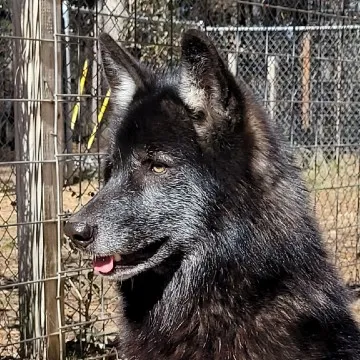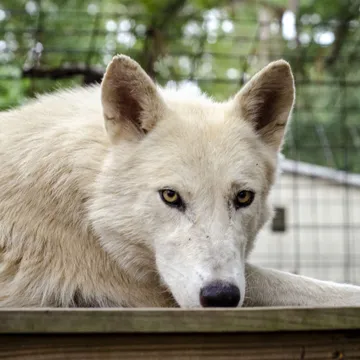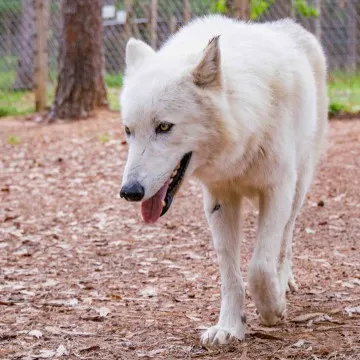Are you captivated by the majestic beauty and intelligence of wolves, but also desire the companionship of a domestic dog? A wolf hybrid might seem like the perfect solution. However, finding a reputable breeder or rescue organization offering wolf hybrids for sale near you requires careful consideration and research. This guide provides information on finding, understanding, and responsibly acquiring a wolf hybrid.
Understanding Wolf Hybrids
Before embarking on your search for “Wolf Hybrid For Sale Near Me,” it’s crucial to understand what a wolf hybrid truly is. These animals are the result of breeding a domestic dog with a gray wolf, red wolf, or eastern wolf, which results in varying degrees of wolf ancestry. The percentage of wolf blood can significantly impact their behavior, temperament, and care requirements.
- High Content Wolf Hybrids: These animals have a greater percentage of wolf genes and typically exhibit more wolf-like traits. They require experienced owners who understand wolf behavior and can provide specialized care.
- Low Content Wolf Hybrids: These hybrids have a lower percentage of wolf genes and may exhibit more dog-like characteristics. However, they still require careful socialization and training.
Where to Find Wolf Hybrids for Sale (and Why Adoption is Preferred)
While the allure of purchasing a wolf hybrid might be strong, it’s important to consider the ethical implications and the availability of wolf hybrids in need of rescue.
Rescues and Sanctuaries: Your first stop should always be wolf hybrid rescues and sanctuaries. Many of these animals end up in rescues due to owners being unprepared for the unique challenges of owning a wolf hybrid. Adopting from a rescue not only gives a deserving animal a home but also supports organizations dedicated to their well-being.
- Benefits of Adoption: Often, rescued wolf hybrids have been temperament tested, and the rescue organization can provide valuable insights into their personality and needs. This increases the chances of a successful placement.
 Ripley the Wolfdog
Ripley the WolfdogAdopting a wolfdog like Ripley could give a deserving animal a loving home and support rescue efforts.
Reputable Breeders (Proceed with Caution): If you’re considering purchasing from a breeder, exercise extreme caution. Responsible breeders of wolf hybrids are rare, and it’s crucial to find one who prioritizes the health and temperament of their animals.
- Red Flags to Watch Out For:
- Breeders who are unwilling to provide detailed information about the lineage of their animals.
- Breeders who are not transparent about the potential challenges of owning a wolf hybrid.
- Breeders who do not allow you to visit their facilities or meet the parents of the puppies.
- Breeders who prioritize profit over the well-being of their animals.
- Red Flags to Watch Out For:
Online Marketplaces and Classifieds (Avoid): Steer clear of online marketplaces and classifieds advertising wolf hybrids. These sources often lack transparency and accountability, increasing the risk of acquiring an animal from an irresponsible or unethical breeder.
Key Considerations Before Acquiring a Wolf Hybrid
Owning a wolf hybrid is a significant commitment that requires careful planning and preparation. Before searching for “wolf hybrid for sale near me,” ask yourself the following questions:
Legality: Check your local and state laws regarding wolf hybrid ownership. Many areas have strict regulations or outright bans.
Experience: Do you have experience handling animals with challenging behaviors? Wolf hybrids require experienced owners who understand canine behavior and are willing to invest in specialized training.
 Athena Needs Sponsorship
Athena Needs SponsorshipConsider the long-term financial commitment involved, including potential healthcare and training needs for a wolfdog like Athena.
Housing: Can you provide a secure and spacious environment for a wolf hybrid? They require large, fenced enclosures to prevent escape and ensure their safety.
Socialization: Are you prepared to dedicate significant time and effort to socialize your wolf hybrid? Early and ongoing socialization is crucial to prevent fear-based aggression.
Diet: Are you able to provide a diet that meets the unique nutritional needs of a wolf hybrid? Consult with a veterinarian experienced in wolf hybrid care to develop an appropriate feeding plan.
Veterinary Care: Can you find a veterinarian who is knowledgeable and willing to treat wolf hybrids? Many veterinarians lack experience with these animals, which can make finding appropriate care challenging.
Financial Commitment: Are you prepared for the financial costs associated with owning a wolf hybrid? These animals may require specialized care, training, and enclosure maintenance, which can be expensive.
Responsible Ownership and Long-Term Commitment
Owning a wolf hybrid is not for everyone. These animals are complex, challenging, and require a lifetime commitment. Before bringing a wolf hybrid into your home, carefully consider the responsibilities involved and ensure you are prepared to provide the care and attention they need. If you are patient and dedicated, then you might be the right human for them. However, remember that you may need to prepare to adapt to them more than you expect them to adapt to you.
 Karma Requires a Foster Family
Karma Requires a Foster Family
Caring for a wolfdog can be tough. Are you prepared to make a lifetime commitment to Karma or other wolfdogs that require ongoing care and attention?

 Athena Needs Sponsorship
Athena Needs Sponsorship